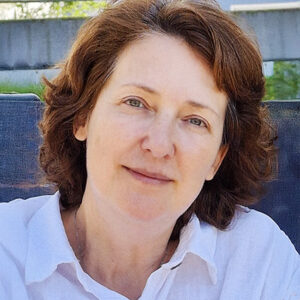Prof. Dr. Dana Jalobeanu
The way we think and live today has strong roots in the past. To understand who we are we need to learn a lot of history — history of philosophy, history of science, and sometimes quite a lot of philosophy of science as well. These disciplines teach us that sixteenth and seventeenth centuries were crucial for the emergence of modern world (and of the modern mind). This is the period that came to be known as the ‘early modernity.’
Early modern philosophy has become an academic discipline at the end of the 20th century and has grown ever since into a thriving field of research. More recently, we have added to it another field, that of early modern science(s).
The Early Modern Lab is a research unit dedicated to an interdisciplinary, international and integrated investigation of early modern philosophy and the sciences.
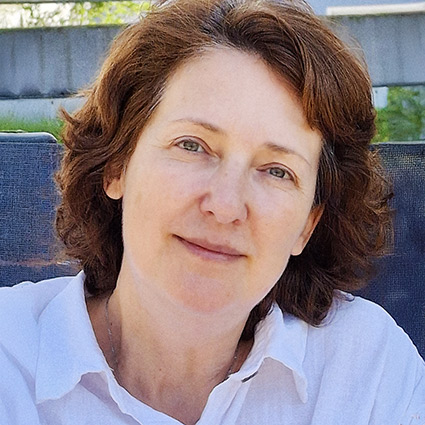
Prof. Dr. Dana Jalobeanu
Professor of History of Philosophy with special focus on Early Modern Philosophy
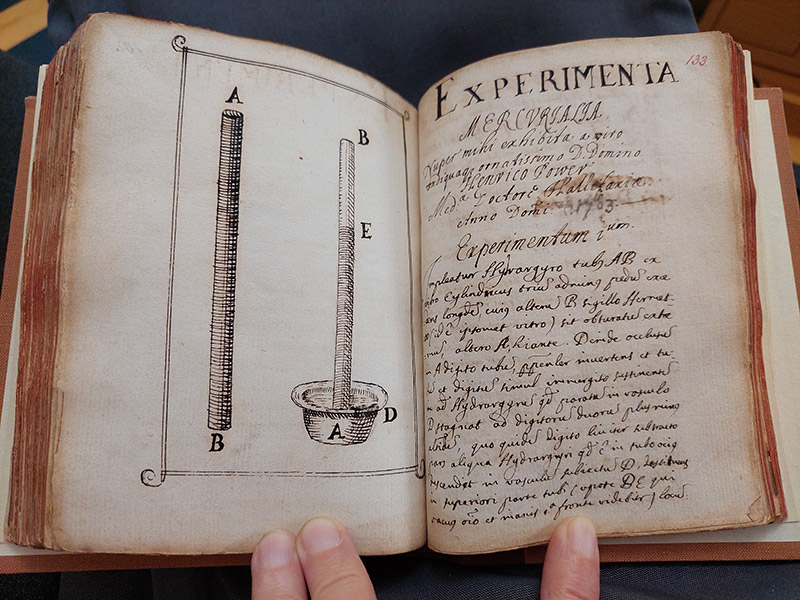
Henry Power at the cross-roads of experimental philosophy: test, trials, and hypotheses
Workshop organized by Prof. Dr. Dana Jalobeanu
1-2. December 2025, University of Technology Nuremberg
Invited speakers: Gideon Manning (Claremont Graduate University), Oana Matei (Western University Vasile Goldis, Arad), Grigore Vida (Institute of Philosophy of the Romanian Academy, Bucharest)
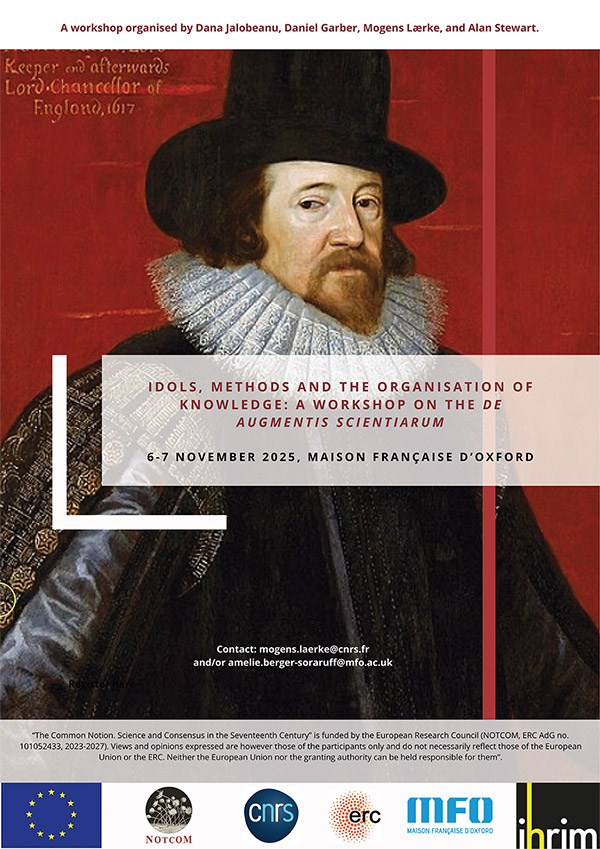
Idols, method and the organization of knowledge.
A workshop on the De augmentis scientiarum
Organized by Dana Jalobeanu, Daniel Garber, Mogens Laerke and Alan Stewart
Maison Francaise, Oxford
6-7 November 2025
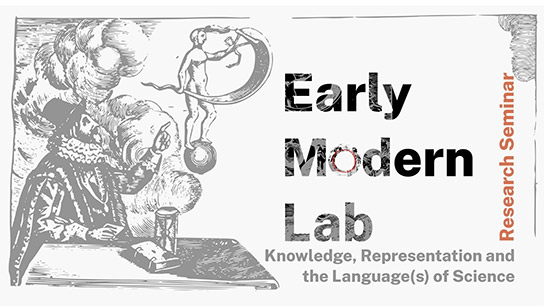
The Research Seminar of the Early Modern Lab
The Research Seminar of the Earl Modern Lab is a weekly hybrid meeting of researchers and students, dedicated to discussing work-in-progress and research projects. It aims to be both inter and cross-disciplinary, bringing together scholars from different fields: history of philosophy, history of science, philosophy of science, classics, digital humanities, AI and computer science.
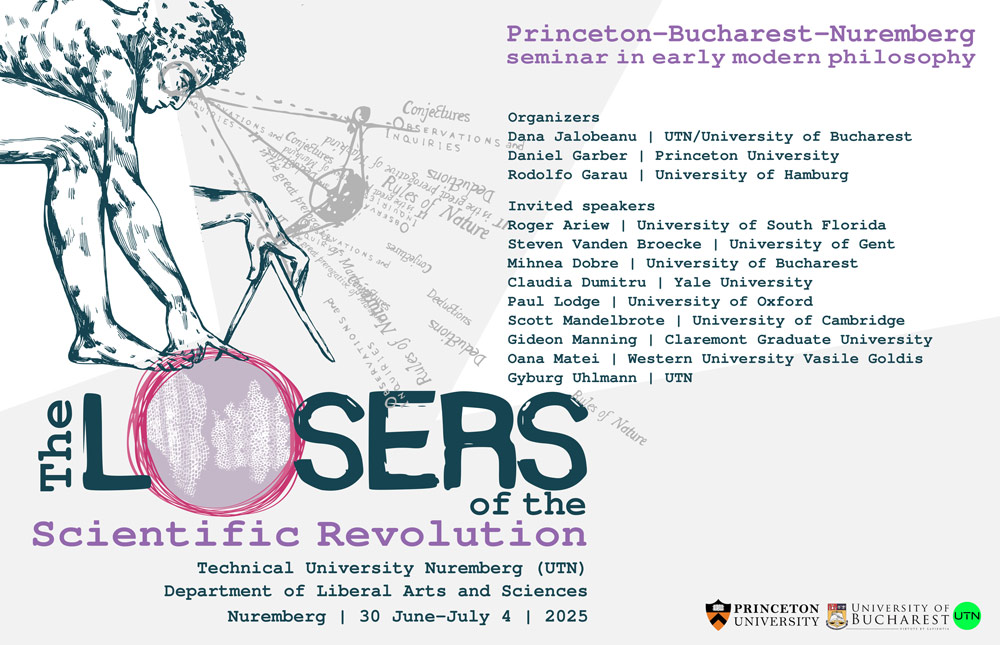
Princeton Bucharest Nuremberg Seminar
The Princeton-Bucharest Seminar in Early Modern Philosophy was established in 2001 by Dana Jalobeanu (University of Bucharest), Vlad Alexandrescu (University of Bucharest) and Dan Garber (Princeton University). From 2025, the Princeton-Bucharest Seminar in Early Modern Philosophy is moving to Nuremberg. University of Technology Nuremberg has joined in as a permanent partner. This year’s theme is “The Losers of the Scientific Revolution”.
News
| 15.4.2025 | We are hiring! We look for an outstanding candidate with an interest in early modern philosophy and the sciences, willing to join our team. Background in history of philosophy and/or history of science, good knowledge of the classical tradition may constitute a plus. Find all the details about our fully funded PhD position here. |
| 9.4.2025 | The Princeton-Bucharest-Nuremberg Seminar in Early Modern Philosophy will take place from June 30 to July 4, 2025. Further information will be available soon. |
Current Research Projects
Solomon Houses of Early Modern Europe: The Diffusion and Transformation of Baconianism
Investigating the diffusion of Baconianism across Europe and the transmission and influence of Bacon’s Sylva Sylvarum and the New Atlantis in different contexts in Northern, Central and Eastern Europe.
From natural magic to science: the modern impact of natural magic recipes and the European diffusion of Giovanni Battista Della Porta’s Magia naturalis.
Investigating the reception and uses of Giovanni Battista Della Porta’s Magia naturalis in the seventeenth century England, in the context of the emergence of experimental philosophy.
The experimental philosophy of Henry Power: a view from the archives.
This project aims to offer a better understanding of mid-seventeenth century experimental philosophy and the interplay between natural philosophy, natural history, theology and moral philosophy. Its focus is the archive of the natural philosopher, medical practitioner and humanist Henry Power (1621-1668). Among the outcomes of the project is a special issue of the Annals of Science co-edited by Dana Jalobeanu and Gideon Manning (in preparation).
The Recipe Project: how experimental knowledge is transmitted from one context to another
More here: Recipes, ‘technologies’, experiments: Enactment and the emergence of modern science – Dana Jalobeanu
Selected Publications
- Dana Jalobeanu, Charles Wolfe (eds.), Encyclopedia of Early Modern Philosophy and the Sciences, Springer: Cham, 2022, 3 volumes
- David Marshall Miller, Dana Jalobeanu (eds.), Cambridge History of Philosophy of the Scientific Revolution, Cambridge University Press, 2022
- Dana Jalobeanu, Spectacolul filosofiei. Cum să citim Scrisorile lui Seneca, Humanitas, București, 2022
- Guido Giglioni, James Lancaster, Sorana Corneanu, Dana Jalobeanu (eds.), Francis Bacon on Motion and Power, Springer, Cham, 2016
- Dana Jalobeanu, The Art of Experimental Natural History: Francis Bacon in Context, Zeta Books, Bucharest, 2015
- Dana Jalobeanu, Peter Anstey (eds.), Vanishing Matter and the Laws of Nature, Routledge: London, 2011
- Creating life in the laboratory: Francis Bacon’s journey from living spirits to animated bodies, Notes and Records of the Royal Society (Jan. 2024), DOI
- Francis Bacon and the practices of measurement, Annals of Science, 71 (2024), 79–99
- On bodies and their orbs, in L. Georgescu & H. T. Andriaenssen (eds.), Springer, 2022, pp. 183–201
- with Peter Anstey, Experimental natural history, in Cambridge History…, Cambridge Univ. Press, 2022
- Dissecting Nature ad vivum, Bruniana & Campanelliana, 28 (1), 2022, 165–183
- with Oana Matei, Spiritual technologies, Nuncius, 1 (2022), 315–345
- Emblems as Epistemic Tools and Heuristic Devices, in Dumbrava & Tataru Cabazan (eds.), Zeta Books, 2022
- Superstition, Idolatry and the Advancement of Learning, Lexicon Philosophicum 9 (2021), 11–32
- On Metaphysics and Method, Epistemology and Philosophy of Science, 58 (3), 2021, 98–118
- Big Books, Small Books…, Journal of Early Modern Studies 10 (1), 2021, 95–104
- Francis Bacon’s “Perceptive” Instruments, Early Science and Medicine, 25 (6), 2021, 594–617
- Experiments in the Making, Early Science and Medicine, 25 (4), 2020, 360–387
- Enacting recipes, Centaurus, 62 (3), 2020, 425–446
- with Doina Cristina Rusu, On the creative power of experimentation, Centaurus, 62 (3), 2020, 381–392
- with Oana Matei, Chemical history of vegetation, Centaurus, 62 (3), 2020, 542–561
- Francis Bacon on Axioms, Laws, Rules and Principles, Revue Roumaine de Philosophie, 64 (2), 2020, 325–340
- Francis Bacon on Sophists, Poets and Other Forms of Self-Deceit, in Anstey & Vanzo (eds.), Routledge, 2019
- Rewriting Francis Bacon’s Natural History, in Garrod & Smith (eds.), Brill, 2019, 180–205
- Spirits Coming Alive, Early Science and Medicine 23 (5–6), 2018, 459–486
- Disciplining experience, Perspectives on Science, 24 (2016), 324–342
- Borders, Leaps and Orbs of Virtue, in Vermeir & Regier (eds.), Springer, 2016, 229–255
- The marriage of physics with mathematics, Minnesota Studies in Philosophy of Science, 20 (2016), 51–81
- Bacon’s apples, in Giglioni et al. (eds.), Springer, 2016, 83–113
All Publications
Team
Prof. Dr. Daniela Jalobeanu
- Phone number: +49 911 92741645
- Email: daniela.jalobeanu@utn.de
You still have questions?
Then contact our Early Modern Lab.

